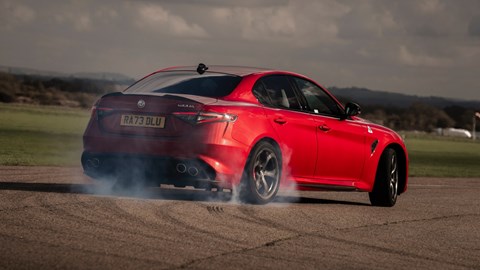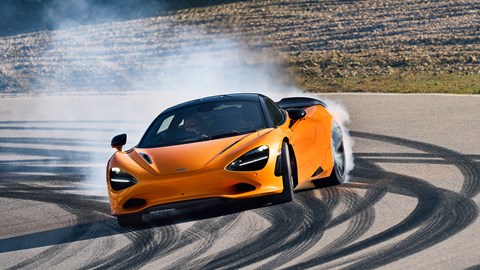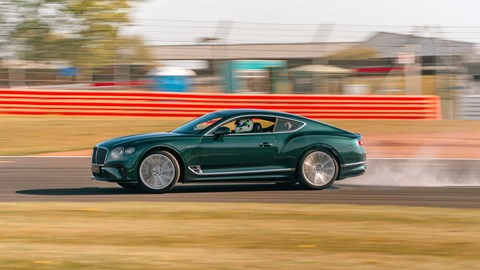► CAR decodes the 2024 election results…
► … focusing on what Labour has planned for UK drivers
► Key proposals = EV chargers and road maintenance
The results for the 2024 general election are in. Labour has claimed a landslide victory, ending 14 years of Conservative control. Now, the party needs to focus on delivering what it promised in its manifesto.
Like most political parties, Labour’s manifesto was more concerned about fixing important national issues such as bolstering our struggling NHS, dealing with a rapidly accelerating climate crisis and organising a recovery plan for the highest rate of inflation the nation has seen for around 40 years.
However, we thought it would be useful to compile a no-nonsense guide that outlined each party’s plans for UK drivers. Motoring policies are important because they affect such a massive portion of the electorate. According to the Office for National Statistics, 75% of people aged 17 and over held a full driving licence in 2022. That’s a huge swathe of the public.
Now that Labour has won the election, we’ll open our guide on its policies. However, we’ve also included the other parties’ plans to give you an idea of what Labour’s rivals be shouting from the other side of the Commons.
Below, we’ve summarised what each party’s plans were for drivers. Plus, because pictures of politicians are boring, we’ve headed each section with an image of a car, (painted in the corresponding party colour, naturally), doing a huge skid. We thought they’d add a splash of excitement to what’s quite a dry topic.
Scroll down for some political journalism, CAR magazine style. Then, if you’re feeling particularly brave, let us know which party’s motoring policies resonate with you most in the comments below.
Labour

Labour’s election campaign focused on five things: kickstarting economic growth, improving our clean energy industry, clamping down on crime, rebuilding the NHS and revising the country’s childcare and education systems to allow all young people to reach their potential irrespective of their class or economic status.
That’s a lot for the party to worry about, but Labour still reckons it has time to implement some interesting motoring policies. The party’s biggest proposed change is to reinstate the 2030 ban on petrol and diesel cars, thus reversing the Tories’ decision to push it back to 2035.
Labour also aims to introduce a fresh piece of legislation for second-hand electric cars. It’ll launch a new, standardised method of recording the health of used EV battery packs which the party says will help drivers make more informed buying decisions.
Labour’s also considering how it can balance the country’s finances with its list of priorities. So, in its fiscal plan, the party states it’ll delay construction of the A27 bypass and reallocate that £65 million budget to repair up to 1 million potholes each year.
The final issues the party hopes to address are the soaring cost of car insurance and the country’s as-yet unfinished EV charging infrastructure. However, the party is yet to provide a budget (or even an estimate) for either of these plans.
To find out more, read the full Labour Party manifesto
Conservatives

The Tories proposed a rather thorough plan for Britain’s motorists – and their policies were quite tactically aimed. We reckon the party was trying to box clever by targeting the most controversial pieces of motoring legislation and offering to ‘fix’ the complaints they caused amongst drivers in an effort to drum up some support.
The party kicked off with a pledge to spend a ‘record’ £8.3 billion on mending potholes and resurfacing roads – money it said would be spent before the end of the 2025 financial year. The Conservatives also said they’d cancel pay-per-mile road pricing and reverse the expansion of the London ULEZ. That latter policy helped the party win its by-election in Harrow, and it obviously thought the same trick would work on a national level. Evidently not.
Other changes promised by the Tories included scrapping the 20mph speed limit in Wales and introducing a local referendum scheme to give residents the chance to contest all future 20mph zones. The lower speed limit was fiercely opposed in Wales and the Tories state that, although it can improve road safety in school zones and residential areas, it doesn’t suit every road to which it’s been applied.
Another change the party proposed is a new Pumpwatch scheme that would have forced petrol retailers to share live pricing information, allowing drivers to easily find the best deal. Plus, the Tories hoped to make fly tipping an offence punishable with penalty points on the offender’s driving licence.
The Conservatives also took the campaign trail as an opportunity to remind us of their new Automated Vehicles Act, which became law in May 2024. The new legislation will allow self-driving cars to hit our roads as soon as 2026. Additionally, the party said it would have remained committed to its promise to halt the construction of all new smart motorways, had it stayed in power.
Finally, like Labour, the Conservatives assured us they’ll bolster the UK’s EV charging infrastructure. However, they never confirmed exactly how they planned to improve the network and how much the project would have cost under their control.
To find out more, read the full Conservative Party manifesto
Liberal Democrats

The Liberal Democrats had a slightly different set of priorities. In addition to reforming our economy and repairing our public services, the party said it would fix our relationship with the EU and tackle climate change. Cars were, obviously, a part of this latter plan – and the Lib Dems said they would have made some changes to our motoring habits.
Electric cars played a big role in this plan. The party promised to ‘make it cheaper and easier for drivers to switch to electric vehicles’ – and to achieve this, it proposed a three-pronged policy assault.
First, the party hoped to concentrate on infrastructure. It said it would have built more public charging points, including low-speed on-street residential chargers and high-speed rapid chargers at motorways service stations. Much like the Conservatives, though, it didn’t given an estimate for the cost of the project.
The Lib Dems also pledged to cut VAT on public charging down to 5% and upgrade the National Grid to allow it to cope with the extra strain. In addition, the party said it would have reintroduced the plug-in car grant and reverted the deadline for the ban on combustion engine cars from 2035 to 2030 (matching Labour).
The party rounded off its motoring policies with a rather sweeping promise to ‘protect motorists from rip-offs,’ claiming it would have worked to control ‘unfair insurance and petrol prices.’ One of the ways the party aimed to achieve this was by expanding its Rural Fuel Duty Relief scheme, which would have seen drivers in areas such as Cornwall, Cumbria and Devon save 5p per litre at the pump.
To find out more, read the full Liberal Democrat manifesto
Green Party

The Green Party proposed some bolder changes to Britain’s motoring landscape. First, the party was adamant that it would stop the sale of all new petrol and diesel cars by 2027. That’s three years sooner than the date fixed by Labour and the Lib Dems. What’s more, the Greens announced they wanted to remove all combustion engine cars from our roads by 2035.
To hit this target, the Green Party mapped out a new scrappage scheme (for which almost every car on the road will be eligible for) and launch a fresh bout of financial support to help drivers afford a new electric car.
Other proposed changes included a reformed road tax system that was proportional to the weight of the vehicle and a default 20mph speed limit in all built-up areas. Plus, the Greens pledged to spend an additional £19 billion over five years on upgrading the nation’s bus and rail services and ‘supporting electrification.’
The Greens stand firm on their policies about pollution, too. So, to trim our travel emissions, the party planned to oppose all new road-building plans and spend £2.5 billion per year on fresh cycleways and footpaths. The idea was to encourage people to step out of their cars and either walk or cycle for their local journeys.
This policy also includes a scheme that would ‘reimagine’ how our residential streets are used. The Greens hoped to ‘reduce traffic’ and open the roads up for ‘community use.’ However, the party is yet to announce how the changes will be made and whether the people they affect will be polled for their opinion before they’re enacted.
To find out more, read the full Green Party manifesto
Reform UK

Reform UK gained a lot of support, claiming a 14.3% share of the vote. For context, the Lib Dems attracted a 12.2%. Reform’s campaign led on policies such as leaving the European Convention on Human Rights, freezing all non-essential UK immigration, rejecting any asylum claims that arrive through ‘safe countries’ and introducing a tougher, zero-tolerance policing strategy.
The party’s aims for the transport sector were similarly daring. Within its first 100 days in office, Reform UK said it would scrap HS2 (which it claimed would save the country a chunky £25 billion). It also planned to cancel every low-emission zone and low-traffic neighbourhood in the nation, abandon the petrol and diesel car ban entirely and remove all legal requirements for car manufacturers to switch to making electric cars.
Reform UK also hoped to immediately issue extraction licences to plum the North Sea’s gas and oil supplies, as well as reverse the UK’s Net Zero targets and bin its related subsidies.
To find out more, read the full Reform UK manifesto